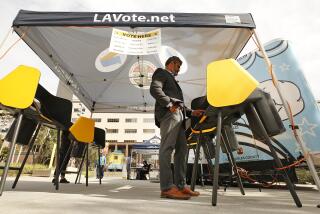Cranston Admits He Faces a Big Fund-Raising Challenge
- Share via
WASHINGTON — Sen. Alan Cranston (D-Calif.), whose political fund-raising has fallen sharply in the wake of the Lincoln Savings & Loan scandal, acknowledged Monday that he faces a daunting challenge to raise sufficient funds for a reelection bid.
Cranston, citing the $13.5 million he spent to be reelected in 1986 and the $20 million that Sen. Pete Wilson (R-Calif.) has budgeted for his governor’s race this year, declared, “God only knows what it’ll take” for his own reelection effort in 1992.
Because of the escalation of campaign costs, he said, the average senator has to raise about $10,000 a week throughout a six-year term in order to have a sufficient campaign war chest for a reelection bid. His own challenge in a state of the size and population of California, he said, has been to raise between $45,000 and $50,000 a week.
The fund-raising challenge for Cranston, who has been severely damaged politically by the Lincoln scandal, will be even more daunting if, as expected, he faces serious opposition in the Democratic primary. In 1986 he faced only token opposition.
The four-term, 75-year-old senator, interviewed at a luncheon session with reporters, showed clear signs of anxiety about his political future. Insisting he is “not concerned at present” about being politically vulnerable, he said, “It’s not clear what shape I’ll be in” for the 1992 election.
Although knowledgeable sources have said he can expect challenges from both Rep. Robert T. Matsui (D-Sacramento) and Rep. Barbara Boxer (D-Greenbrae), Cranston said he doesn’t now foresee any primary opposition.
He pointed out that if Wilson wins the governor’s race and resigns and then appoints his own successor for a two-year term, there will be two Senate races in 1992. “Then take a look at me,” he said, “and see how vulnerable I am.”
A report submitted by Cranston to the Federal Election Committee showed his fund raising dropped off by 35% in the second half of 1989 after he came under heavy fire for intervening with federal regulators on behalf of Lincoln owner Charles H. Keating Jr., a wealthy contributor to Cranston’s campaign. Cranston has denied that he sought special consideration for Keating, maintaining that he told regulators to either charge Keating or get off his back.
Asked if fund raising has improved in 1990, Cranston said in an interview with The Times, “There’s no way to measure at the present time.” But he added, “We are continuing and having some success.”
The role played by Cranston and four other senators who intervened with the Federal Home Loan Bank Board in 1987 when Lincoln was being investigated for mismanagement is being studied by both the Senate Ethics Committee and the Justice Department. Collapse of the Irvine institution two years later left taxpayers saddled with $2 billion in unpaid debts to depositors.
Cranston’s popularity has plunged in public opinion polls and many Democratic Party leaders have suggested that he should retire after this term. But he insists that he will remain in the race even in the face of continuing pressure to retire and the fact that he will be 78 in 1992.
If he “was getting feeble in any way,” he said, he would be willing to resign. “But I’m not,” he said. “I’m mentally and physically in remarkably good shape.”
In the past, Cranston has said that dealing with the fallout from the Lincoln scandal has distracted him from fund raising, but he declared Monday that it has not distracted him from his work.
If he had been distracted, he said, he could not have accomplished as much as he did before the last session of Congress ended. He claimed credit for playing a major role in legislation providing $1 billion in aid to San Francisco earthquake victims, as well as the passage of a major housing bill and two major veterans bills.
Cranston said he doesn’t “intend to go on endlessly,” but that there are a number of issues he wants to work on in another term, including slashing the defense budget and setting priorities for spending funds provided by a “peace dividend.”
Denying once again that his intervention in the Lincoln case involved any wrongdoing, Cranston said, “I believe almost any senator would have done what I did under similar circumstances.”
Several senators, he said, told him, “There but for the grace of God go I,” and they said it “in just those words.”
“Some have said, ‘I’ve done exactly what you’ve done and more,’ ” Cranston said.
More to Read
Get the L.A. Times Politics newsletter
Deeply reported insights into legislation, politics and policy from Sacramento, Washington and beyond. In your inbox twice per week.
You may occasionally receive promotional content from the Los Angeles Times.










